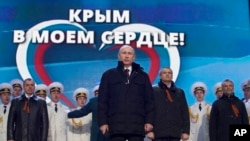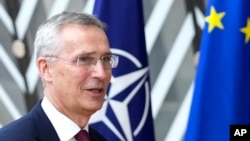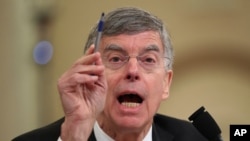WHITE HOUSE - President Joe Biden remains the most reluctant among NATO allies to grant Ukraine a quick pathway to join the alliance, setting up a contentious debate at the summit in Vilnius, Lithuania, next week with eastern flank members who are eager for the war-torn country to join as soon as its conflict with Russia ends.
Publicly, Biden says Ukraine must make additional reforms to qualify for NATO membership, saying in June that he was “not going to make it easier” for Kyiv. But his aides have also signaled that Biden believes a fast-track membership for Kyiv is an invitation for conflict with nuclear-armed Russia, rather than a deterrent.
“We are not seeking to start World War III,” said Jake Sullivan, the president’s national security adviser, in response to VOA’s question during Friday’s White House press briefing.
Biden’s reluctance is puzzling to some observers.
Former U.S. Ambassador to Ukraine John Herbst, who is now senior director of the Atlantic Council's Eurasia Center, criticized the administration for “not leading on this critical issue.”
“This is an historic juncture,” Herbst told VOA. “The administration has obviously made a major commitment to ensure Ukraine does not lose. Why is it dawdling in ensuring that Ukraine emerges successfully from this crisis?”
A key consideration is the potential for the alliance to be dragged into a conflict with Russia. As a pillar of NATO, the U.S. would have to send many of its troops to do the fighting, something that Biden has repeatedly promised he would not do.
From Russia's 2014 annexation of Crimea to its current military invasion, Washington has shown it is not willing to commit American forces to fight Russia on Ukraine's behalf, said George Beebe, director of grand strategy at the Quincy Institute for Responsible Statecraft, a think tank that advocates a restrained U.S. foreign policy.
“Nor should we take on such a commitment, because avoiding a direct war with nuclear-armed Russia is far more important to U.S. security than defending Ukraine,” he told VOA.
While the administration is holding firm on Ukraine’s NATO bid, Sullivan reiterated it would support Ukraine “for as long as it takes” and provide it with “an exceptional quantity of arms and capabilities.”
Those capabilities now include a cluster munitions package, weapons that can kill over a wide area and are banned by more than 100 countries, which Kyiv has been requesting for months amid its artillery shortage. The weapons contain multiple explosive bomblets that can spread widely and stay undetonated on the ground for years.
Responding to criticism for sending such indiscriminate weaponry, Sullivan argued that the risk of letting Russia take more territory outweighs the risk of civilian harm from unexploded bomblets.
Compromise for Kyiv
Days before the summit in Vilnius, NATO's 31 members are still negotiating the final wording of a compromise communique that will signal that Kyiv is moving closer to membership without promises of a quick accession.
“I expect allied leaders will reaffirm that Ukraine will become a member of NATO and unite on how to bring Ukraine closer to its goal,” NATO Secretary-General Jens Stoltenberg said during a press conference in Brussels on Friday.
A key agenda item will be whether the allies will agree to allow Kyiv to bypass the Membership Action Plan, a NATO program to assist countries wishing to join the alliance.
A second track that allies are hoping to secure is a deal to strengthen Ukraine’s armed forces “for as long as it takes,” including its postwar needs, through a series of long-term commitments or security guarantees made by individual allies outside the NATO framework.
“I don't want to talk about specific platforms or systems, just that there will be a more robust discussion about what long-term defense needs Ukraine is going to need,” said John Kirby, National Security Council coordinator for strategic communications, in an interview Thursday with VOA.
Security guarantees
The security guarantees will fall short of NATO’s Article 5 collective defense principle, that an attack on one ally is an attack on all. Some observers find such guarantees insubstantial, referring to the 1994 Budapest Memorandum, wherein the United States, the United Kingdom and the Russian Federation pledged to respect Ukraine’s territorial integrity and to refrain from the threat or use of military force. In return, Kyiv relinquished the world’s third-largest nuclear arsenal, which it had inherited from the collapsed Soviet Union.
Russia breached the memorandum with its 2014 annexation of Crimea.
Battle-worn after 16 months of Moscow’s invasion, Kyiv is skeptical of the value of such assurances. However, they would be useful in the interim, said William Taylor, a former U.S. ambassador to Ukraine who is now vice president for Europe and Russia at the U.S. Institute of Peace.
“Until Ukraine gets into NATO, it needs some way to ensure that it has that military capability to deter Russia,” Taylor told VOA.
Ukrainian President Volodymyr Zelenskyy is set to attend the two-day Vilnius summit to make the case that his country should join when the conflict ends. He said the indecision is threatening the strength of the alliance and global security.
“I think there is not enough unity on this,” Zelenskyy said Friday in a press conference during his visit to Slovakia, reiterating his request for “concrete steps” on Kyiv’s movement toward membership.
Sweden’s accession
Another unresolved issue ahead of the Vilnius summit is Sweden’s bid to join the alliance, which has not been ratified by Turkey or Hungary, in a process that must be unanimous among all current members.
Last-minute negotiations continue between Stoltenberg and the leaders of Turkey and Sweden aimed at overcoming Turkish President Recep Tayyip Erdogan’s objections to the Nordic country joining NATO. Ankara has accused Sweden of being too lenient toward militant Kurdish organizations that Turkey considers terrorist groups.
Observers say those concerns deflect the real issue, which is Ankara’s long-delayed request to purchase F-16 fighter jets made by the U.S. company Lockheed Martin. The sale is held up in the U.S. Congress, which has authority to block major weapons sales, as leading senators from both parties insist Ankara must first drop its objections to Sweden’s accession.
Iuliia Iarmolenko and Tatiana Vorozhko contributed to this report.








